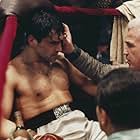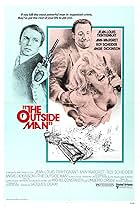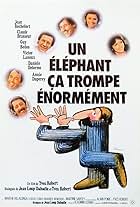As female directors make more and more their presence felt on the French scene , it's obvious that Nicole Garcia ,who is also a talented actress , is to be ranked among the finest film makers .If the word "auteur" is still relevant ,she is definitely so.
"Un Beau Dimanche" resumes two of her earlier subjects : the divorced couple , vying for their child was present in "Un Dimanche sur deux" ; as for the misfit, who cannot find his place in his family ,he was already in Garcia's most impressive achievement "l'Adversaire" :its hero was mentally-disturbed , freakish , deadpan when he committed the worst acts (Daniel Auteuil is unforgettable), and the façade showed the perfect family, but he was never part of it.
Baptiste is some kind of misfit too ,a nice guy ,unlike the monster of "l'adversaire" , but his bourgeois family was not prepared to accept his turning back from his bright prospects and had him institutionalized .....whereas ,in the viewer 's eyes ,he is perfectly sane ,as sane as the hero of Georges Franju' s "la tête contre les murs" (1960).
In its first part , "un beau dimanche" may disappoint because the screenwriters refuse to give us any information about Baptiste : a solitary man, who has chosen to be a substitute for grade school teachers ,whose relationship with his pupils seems excellent (the headmaster would like to keep him in his school); one of his students is torn between a violent father and an ex-drug- addicted mom (who is clean now),Sandra.
Baptiste and Sandra are world aparts :he is educated , we're told he studied in an American university ,she 's a waiter in a restaurant on the beach .But both are misfits , both are rejected by a wealthy family and a husband she should not have married in the first place.
The movie hits his stride in its second part,when they arrive in Baptiste's family's desirable mansion ,complete with pool and tennis court .Masterfully Garcia makes us feel her hero's uneasiness ; except maybe the mother (played by the marvelous Dominique Sanda who blows everyone off the screen when she is present ), no one shows some affection or emotion.
The apex is the meal they share in the park :a portrayal of a self-satisfied ,smug ,contemptous bourgeoisie , who uses the English language as snobbery , who
despises this intruder whose place in no longer among them,the winners ;I would go as far as to write that Garcia beats Claude Chabrol at his own game in this field ; "why don't you make your nephews do a dictation ?"one of his despising brothers asks him : for those people "who make money ", being a teacher is a disgrace .Only the mother shows compassion ,tries to understand her son's (and also her late husband's) behavior : she's the only one who suffers from his going away ;the father was an ambiguous character : he' s responsible for his confinement ,but there's this unexpected map where all the places his son teaches are indicated .
As soon as his meets again his family ,we know that he is not welcomed as the prodigal son; the fatted calf ( the hefty sum he asks for Sandra ) leaves a bitter aftertaste in the mouth ; even Sandra 's boy cannot play with the children of the château: "they are cousins" says he ;but actually they are privileged brats who do not even know it's not so rosy outside their protected world.
A demanding work ,which confirms Garcia as a leading director.























